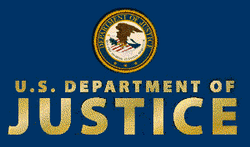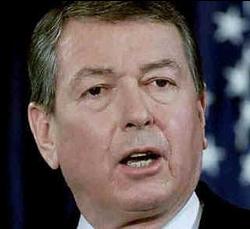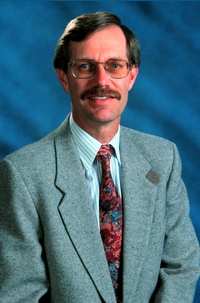Truck Driver Pleads Guilty To Supporting Al-Qaeda
Terrorists
 The Justice Department announced Thursday that a
U.S. truck driver has pleaded guilty to charges of supporting
al-Qaeda terrorist projects in the United States.
The Justice Department announced Thursday that a
U.S. truck driver has pleaded guilty to charges of supporting
al-Qaeda terrorist projects in the United States.
Iyman Faris, also known as Mohammed Rauf, a Kashmir native who
entered the United States in 1994 and became a U.S. citizen in
1999, pleaded guilty on May 1 to "conspiracy to provide material
support to the al-Qaeda organization, as well as providing material
support to that terrorist group," announced Attorney General John
Ashcroft June 19.
In remarks prepared for delivery at a Washington news
conference, Ashcroft said that Faris had traveled to Pakistan and
Afghanistan, met with Osama Bin Laden and helped al-Qaeda by doing
research and scouting U.S. sites intended to be targets of
al-Qaeda's future acts of terrorism.
For several years Faris worked as an independent truck driver
from his home base of Columbus, Ohio, and traveled across the
country, "making deliveries to airports and businesses without
raising any suspicions," the attorney general said.
U.S. intelligence, law enforcement and homeland security
communities were able to piece together Faris' communications to
al-Qaeda through his use of cell phones and the Internet. "This
case sends a clear message that the United States will continue to
be vigilant against all threats, whether they come from overseas or
here at home," Ashcroft said.
 Ashcroft explained, "Faris led a secret, double
life. He traveled to Pakistan and Afghanistan, covertly met with
Osama Bin Laden, and joined Al Qaeda's jihad against America.
Ashcroft explained, "Faris led a secret, double
life. He traveled to Pakistan and Afghanistan, covertly met with
Osama Bin Laden, and joined Al Qaeda's jihad against America.
"From late 2000 to March of this year, Faris worked in concert
with our Al Qaeda enemies to plot potential attacks against America
and its citizens here in his adopted homeland.
"This afternoon, I am announcing that Judge Leonie Brinkema, of
the United States District Court in the Eastern District of
Virginia, has unsealed the guilty plea of Iyman Faris, a/k/a
Mohammed Rauf.
"On May 1st, Faris pled guilty to two charges: conspiracy to
provide material support to the Al Qaeda organization, as well as
providing material support to that terrorist group."
Here's What Faris Admitted:
- In late 2000, meeting with Osama Bin Laden and other senior Al
Qaeda operatives;
- In late 2000 or early 2001, providing Al Qaeda with research on
ultralight planes, which Al Qaeda intended to use in its
terrorism;
- In early 2001, providing Al Qaeda with material support,
including dealings involving cash, thousands of sleeping bags,
plane tickets, and cell phones; and
- Between April 2002 and March 2003, scouting sites for acts of
terrorism in the United States, including a bridge in New York and
train tracks.
Faris was born in Kashmir on June 4, 1969. He entered the United
States in May 1994 and became a United States citizen in December
1999. For several years he has worked as an independent truck
driver from his home base of Columbus (OH).
The "Ultralight Connection"
 According to the plea documents, in late 2000, Faris traveled
to Pakistan and joined with a long-time friend and supporter of Al
Qaeda to travel to Afghanistan. There, at an Al Qaeda training
camp, Faris met with Osama Bin Laden. During his stay in the camp,
Faris was asked by one of Bin Laden's lieutenants about obtaining
information about "ultralight" airplanes. Faris agreed to do
so.
According to the plea documents, in late 2000, Faris traveled
to Pakistan and joined with a long-time friend and supporter of Al
Qaeda to travel to Afghanistan. There, at an Al Qaeda training
camp, Faris met with Osama Bin Laden. During his stay in the camp,
Faris was asked by one of Bin Laden's lieutenants about obtaining
information about "ultralight" airplanes. Faris agreed to do
so.
Approximately two months later, back in Pakistan, Faris admits
that he went to a Karachi Internet café and performed an
online search. He downloaded information about ultralight aircraft
and provided it to an Al Qaeda representative.
In 2002, Faris outlined to an Al Qaeda terrorist leader his job
as a truck driver, detailing his routes and deliveries for airport
cargo planes. The senior Al Qaeda operative was interested in the
cargo planes, according to Faris, because they would hold "more
weight and more fuel."
Terrorists' Conclusions
Faris's "ultralight connection" apparently proved a dead end.
The terrorists, after hearing what he had learned, seemed to turn
him in another direction. The AG detailed more activities, aimed at
destructin of bridges, for example, that his handlers thought to be
more-feasible destructive activities. Fortunately, Faris was nabbed
this Spring.
EAA Responds.
 Because the uneducated mass media will doublessly
seize upon this one small part of Ashcroft's report, and because so
many in those media are still paranoid about anything that flies,
the "U/L connection" will, no doubt, get a lot of play.
Ultralighters in particular, and pilots of small aircraft in
general, will again be looked at suspiciously. The EAA's Executive
Vice President, Bob Warner (right), has anticipated that reaction,
and has issued the following statement. His points are
unassailable:
Because the uneducated mass media will doublessly
seize upon this one small part of Ashcroft's report, and because so
many in those media are still paranoid about anything that flies,
the "U/L connection" will, no doubt, get a lot of play.
Ultralighters in particular, and pilots of small aircraft in
general, will again be looked at suspiciously. The EAA's Executive
Vice President, Bob Warner (right), has anticipated that reaction,
and has issued the following statement. His points are
unassailable:
"We [EAA] are pleased to see the efforts of our nation's
security agencies continue to break down those organizations bent
on doing America harm. The ironic point in the news reports,
however, is that the convicted operative likely discovered during
his research that ultralight aircraft are rather poor
terrorist tools. Limitations on weight, speed and
operating parameters make ultralights bad choices -- either as a
weapon or as an escape vehicle."
 Classic Aero-TV: In Praise of Alabamas Patriot Aircraft USA
Classic Aero-TV: In Praise of Alabamas Patriot Aircraft USA NTSB Final Report: Cirrus Design Corp SR22
NTSB Final Report: Cirrus Design Corp SR22 ANN's Daily Aero-Term (12.21.25): Dead Reckoning
ANN's Daily Aero-Term (12.21.25): Dead Reckoning ANN's Daily Aero-Linx (12.21.25)
ANN's Daily Aero-Linx (12.21.25) Aero-News: Quote of the Day (12.21.25)
Aero-News: Quote of the Day (12.21.25)






